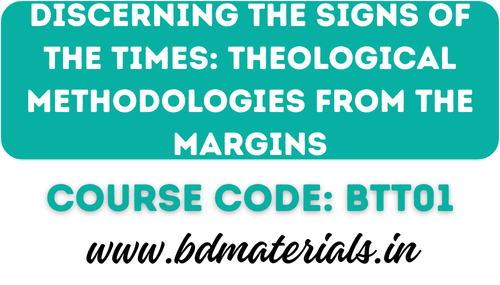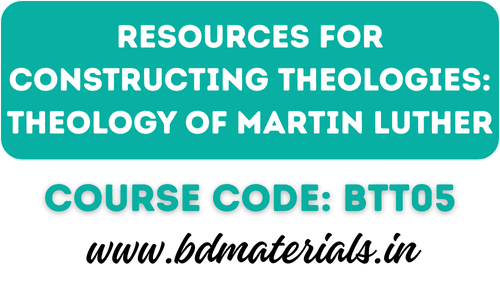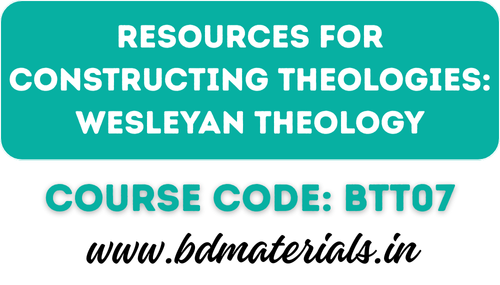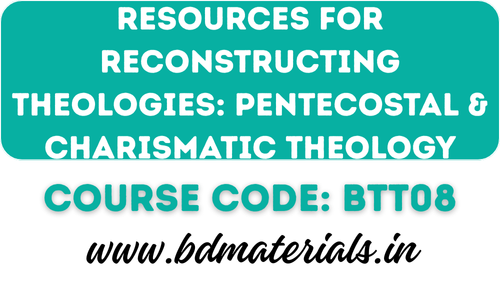Course Code: BTT12
Introduction to Christian Theologies in India
BD III, Semester II, 4 Credit Hours, Senate Paper
Course Objectives
- To enable the students to understand critically the rich diversity of theological reflections and praxis in India emerged as faith responses to particular socio-cultural and religious challenges.
- To help the students to understand the methodological and epistemological shifts in the history of Christian theologies in India with special emphasis on the distinctive perspectives on Christology, Trinity, ecclesiology, and Christian public witness.
- To challenge the students to engage in the process of contextual reformulations of the Christian faith and praxis in India, informed by the discernment of the signs of the times.
Pedagogical Methods
Lectures, seminar presentations, group discussions, and interactive sessions are some of the pedagogical methods that can be used in this course. Interactive sessions can be arranged for each week where different students can be asked to engage in a conversation representing the theologians that belong to the topic for the week. Instructors are expected to provide at least 50 pages of required readings for each week.
Course Requirements
- Final Examination 100%
Course Outline
- UNIT I: Methodological Issues in Indian Christian Theologies
- The nature and necessity of Indian Christian Theologies
- Methodological Shifts in Indian Christian Theologies
- The Sources/Pramanas of Indian Christian Theologies
- Scriptures
- Philosophies
- Experience
- UNIT II: Scriptures
- Christian Scripture and other Scriptures
- Indian Perspectives on Biblical Hermeneutics
- Indian Contextual Hermeneutical Methods
- UNIT III: Formative Stages of Indian Christian Theologies
- Indian Renascent Engagement with the Gospel of Christ
- Missionary Constructions of Indian Christian Theologies
- Indian Thought-world and Indian Christian Theologies
- Bhakti Traditions and Indian Christian Theologies
- Theology of Nation Building
- Peoples’ Experiences and Indian Christian Theologies
- UNIT IV: Theology of Interfaith Dialogue
- UNIT V: Christology in Indian Traditional Approach
- Jesus as Advaiti
- Jesus as avatar
- Jesus as Fulfiller
- Christ as prajapati
- Jesus as Sat-Guru
- Christ as the adi purusha
- Unknown Christ
- Pneumatic Christology
- UNIT VI: Christology in Indian Contextual Approach
- Christ the Liberator
- Dalit Christ
- Tribal Christ
- Adivasi Christ
- Feminist Christ
- UNIT VII: Trinity
- Trinity as Sat Cit Ananda
- Trinity as Karma Marga, Bhakti Marga and Gyaan Marga
- Trinity as the Radical Community of Equals
- Indian Orthodox thinking on the Trinity
- < strong>UNIT VIII: Ecclesiology
- Church as Diaconal Community
- Churchless Christianity
- Church as People’s Movement
- Church as Ashrams
- UNIT IX: Salvation
- Salvation as Moksha
- Salvation as Liberation
- Salvation as Humanization
- Salvation as Deification
- UNIT X: Christian Life and Mission
- Nationalism and Nation Building
- Conversion
- Baptism
- Pluralism
- Dialogue
- UNIT XI: Indian Christian Theologies: Challenges and Prospects
Bibliography
Basic Books
- Boyd, Robin. An Introduction to Indian Christian Theology. Delhi: ISPCK, 1884.
- BTESSC/SATHRI and CDSS, 2005.
- Thomas, M.M. and P.T. Thomas. Towards an Indian Christian Theology: Life and Thought of Some Pioneers. Tiruvalla: New Day Publications, 1992.
- Sugirtharajah, R.S. and Cecil Hargreaves. Reading in Indian Christian Theology Vol. I. London: SPCK, 1993.
- Kumari, Prasanna, ed. Feminist Theology: Perspectives and Praxis. Chennai: GLTC, 199?.
- Longchar, Wati. An Emerging Asian Theology: Issue, Method, and Perspective. Jorhat: Tribal Study Centre, ETC, 2001.
- Samartha, Stanley J. One Christ Many Religions. Geneva: WCC, 1996.
General Books
- Abhishiktananda, Swami. In Spirit and Truth: An Essay on Prayer and Life. Delhi: ISPCK, 1989.
- Abraham, K.C. Transforming Vision: Theological-Methodological Paradigm Shifts. Tiruvalla: CSS Books, 2006.
- Aleaz, K.P. Christian Thought Through Advaitha Vedanta. Delhi: ISPCK, 1996.
- Aleaz, K.P. From Exclusivism to Inclusivism: The Theological Writings of Krishna Mohan Banerjee (1813-85). Delhi: ISPCK, 1999.
- Ambedkar, B.R. Annihilation of Caste. Bangalore: Dalit Sahitya Akademy, 1987.
- Anderson-Rajkumar, Evangeline. “Towards Theologizing in the Indian Context – A Women’s Perspective.”
- Appasamy, A.J. The Theology of Hindu Bhakti. Madras: CLS, 1970.
- Balasundaram, Franklyn. Contemporary Asian Christian Theology. Delhi: ISPCK, 1995.
- Clarke, Sathianathan. Dalits and Christianity: Subaltern Religion and Liberation Theology in India. Delhi: Oxford University Press, 1999.
- Devanandan, R.D. The Gospel and the Hindu Intellectual: A Christian Approach. Bangalore: CISRS, 1959.
- Farquhar, J.N. The Crown of Hinduism. London: Oxford University Press, 1913.
- George, K.M. “Nature and Method of Theology: An Eastern Christian Perspective.” In Intercultural Asian Theological Methodologies: An Exploration. Edited by Samson Prabhakar. Bangalore: S ATHRI, 2002.
- George, Samuel. “’Churchless Christ’ (A Hindu ‘Plea’): A Christian Theological Response.” Doon Theological Journal 6, no. 1 (March 2009): 38-64.
- George, Samuel. “’Unknown Christ’: Jesus Christ in the Writings of Raimundo Panikkar.” New Life Theological Journal 4, no. 2 (July-December 2014): 114-165.
- George, Samuel. “Christology and Complementarity: Search for a ‘new’ Lingua Franca.” Bangalore Theological Forum XLVI, no. 1 (June 2014): 93-108.
- George, Samuel. The Historical Particularity of Jesus: A Dialogue with the Hindu View of History. Kolkata, India: Punthi Pustak, 2014.
- Gnanakan, Ken. Salvation: Some Asian Perspectives. Bangalore: Asia Theological Association, 1992.
- Gnanakan, Ken. The Pluralistic Predicament. Bangalore: Theological Book Trust, 1992.
- Gregorios, Paulose Mar. A Light Too Bright: The Enlightenment Today. New York: State University Press, 1992.
- Gregorios, Paulose Mar. The Human Presence: An Orthodox View of Nature. Madras: CLS, 1980.
- Hogg, A.G. Karma and Redemption. Madras: CLS, 1970.
- Hnuni, R.L. Vision for Women in India. Bangalore: Asian Trading Cooperation, 2009.
- Jathanna, O.V. “Indian Christian Theology: Methodological Reflections.” Bangalore Theological Forum 18/2-3 (April-September, 1986): 59-74.
- Jathanna, O.V. “The Madras Rethinking Group and its Contributions to the Development of Indian Christian Theology.” Religion and Society 44/3 (September 1997): 74-97.
- Kappen, Sebastian. Jesus and Freedom. Maryknoll, New York: Orbis, 1977.
- Lipner, Julius J. Brahmabandhab Upadhyaya: The Life and Thoughts of a Revolutionary. Delhi: Oxford University Press, 1999.
- Massey, James, and Samson Prabhakar, eds. Frontiers in Dalit Hermeneutics. Bangalore/Delhi: Nalunnakkal.
- Mathew, George. Green Liberation. Delhi: ISPCK, 1999.
- Nirmal, Aravind. “Towards a Christian Dalit Theology.” In Frontiers in Asian Christian Theology: Emerging Trends. Edited by R.S. Sugirtharajah. Maryknoll: Orbis Books, 1994.
- Hirmal, Aravind. Heuristic Explorations. Madras: GLTC & CLS, 1990.
- Panikkar, Raymond. “Indian Theology: A Theological Mutation.” In Theologizing in India. Edited by M. Amaladoss, et al. Bangalore: TPI, 1981.
- Panikkar, Raymond. Unknown Christ of Hinduism.
- Prabhakar, A.M. Balwant. The Theology of Nehemiah Goreh. Madras: CLS, 1969.
- Rufus, Peniel Rajkumar. Dalit Theology and Dalit Liberation: Problems, Paradigms, and Possibilities. London: Ashgate, 2010.
- Samuel, Simon. “Redding Postcolonial Creative Discourses: Towards Modeling a Strategic Postcolonial Theology of/for the Marginalia.” Doon Theological Journal 5.2, September 2008, pp. 165-182.
- Scott, David C., ed. Keshub Chunder Sen. Madras: CLS, 1979.
- Sebastian, Jayakiran J. “Pressure on the Hyphen: Aspect for the Search for Identity Today in Indian-Christian Theology.” Religion and Society 44/4 (December 1997): 21-41.
- Sharpe, Eric. Theology of A. G. Hogg. Madras: CLS, 1971.
- Söares-Prabhu, George M. The Dharma of Jesus. New York: Orbis Books, 2003.
- Stephen, M. A Christian Theology in the Indian Context. Delhi: ISPCK, 2015.
- Sugirtharajah, R.S. Asian Biblical Hermeneutics and Postcolonialism: Contesting the Interpretations. Maryknoll: Orbis Books, 1998.
- Sugirtharajah, R.S. The Bible and the Third World: Precolonial, Colonial, and Postcolonial Encounters. Cambridge: Cambridge University Press, 2001.
- Thangasamy, D.A. The Theology of Chenchiah. Bangalore: CISRS, 1966.
- Thomas, Amit. Christ in Multidimensional Context. New Delhi: Christian World Imprints, 2015.
- Thomas, Amit. “Relevance of Narrative Theology in Developing Indian Christian Theology.” Allahabad Theological Journal 4 (2014): 15-26.
- Thomas, M.M. Salvation and Humanization. Madras: CLS, 1971.
- Thomas, M.M. The Secular Ideologies of India and the Secular Meaning of Christ. Madras: CLS, 1976.
- Thomas, M.M. The Acknowledged Christ of the Indian Renaissance. Madras: CISRS/CLS, 1970.
- Thomas, P.T. Vengal Chakarai. Vol. 1. Madras: CLS, 1981.
- Thomas, T. Jacob. “Challenge of Nonfoundationalism to Indian Christian Theology.” In Mission with the Marginalized: Life and Witness of Rev. Dr. Prasannakumari Samuel. Edited by Samuel Meshack. Tiruvalla: CSS Books, 2007.
- Thomas, T.K. A Christian Response to Gandhian Satyagraha: The Witness of S. K. George. Tiruvalla: CSS Books, 2000.
- Thomas, V.V. “Post-Colonialism, Post Modernism, Post Pentecostalism: Challenges and Perspectives.” In Theologizing in India Today: Some Reflections. Bangalore: SKPHRI, 2007.
- Vandana. Waters of Fire. Madras: CLS, 1981.
- Victus, Solomon. “A Forgotten Indian Theologian – J. C. Kumarappa.” Bristol (U.K.): Pilgrims, Magazine of the Friends of the Church in India, March/April, 2006, No. 28.
- Victus, Solomon. “Theological Enquiries of Dr. J. C. Kumarappa: A Forgotten Fact in the Indian Christian Tradition.” AJTR, Vol. XU!, No. 122, Jan-Dec. 2002.
- Vmayaray, Y.L. Re-imagining Dalit Theology: Post-Modern Readings. Tiruvalla: CSS, 2008.
- Wilfred, Felix. Dalit Empowerment. Delhi: ISPCK, 2008.
- Wilfred, Felix. Margins: Site of Asian Theologies. Delhi: ISPCK, 2008.
Friendly Note
Bachelor of Divinity Materials is your one-stop resource for comprehensive Biblical studies, designed to support students pursuing a Bachelor of Divinity (B.D.) and other theological courses. Our website is a dedicated platform that provides access to the full syllabus of the Bachelor of Divinity course along with detailed answers, ensuring a thorough understanding of every subject and topic covered in your curriculum.
Here, you will find a vast collection of assignments, study guides, articles, and research papers meticulously curated to assist you in excelling academically. The platform also features a rich selection of theological books, journals, and resources spanning diverse subjects such as Old Testament, New Testament, Systematic Theology, Church History, Biblical Languages, and Pastoral Studies.
To make your learning experience convenient and accessible, we offer downloadable PDFs of study materials, including books and journals, allowing you to learn anytime, anywhere. Whether you are preparing for exams, writing assignments, or conducting in-depth research, these resources are tailored to meet the needs of both students and scholars in biblical and theological studies.
With a commitment to empowering theological learners, our mission is to provide high-quality, authentic, and practical study materials. Explore Bachelor of Divinity Materials to grow spiritually, academically, and intellectually as you deepen your understanding of God’s Word and Christian doctrine. This platform is a valuable resource for aspiring ministers, pastors, and anyone dedicated to the study of theology and biblical teachings.






